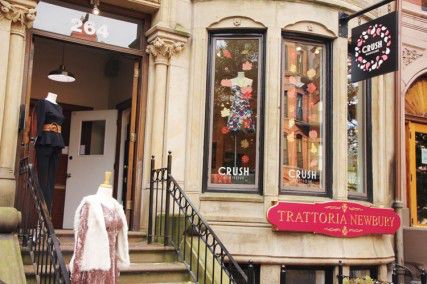Although small stores lining Newbury Street face daunting rental rates and constant competition from more than 60 businesses, employees said their business has adapted to keep their locations on Boston’s fashion-friendly street.

Robin Helfand, owner of Robin’s Candy Shop on Newbury Street, said the key to having success is being open for extended periods of time.
“You have to have steady business, so we’re open seven days a week,” she said. “We’re open year-round. We tend to stay open for quite a few of the holidays. One of the real keys to our success is we stay open late.”
Robin’s Candy Shop is one of many small independently owned stores on Newbury Street vying for customers within a short eight blocks in Boston.
While some store owners said they see competition on Newbury Street as difficult with a disappointing turnover rate, others said they were attracted to the area because of the success of small businesses.
James Dewar, Brooks Brothers’ general manager, said the Newbury Brooks Brothers has been open since 1928 and the turnover rate of stores on Newbury Street is disheartening.
“I wish that the rents were more inviting,” Dewar said. “I don’t think there’s any low-rent district on Newbury, and I think we belong here.”
Despite these factors, Dewar said his larger franchise store is able to remain competitive.
“I think our clientele is a fair mix of people who have always shopped at Brooks Brothers and people from outside of the area who have heard of us and like what they see,” he said. “There’s a lot of tourist traffic on Newbury Street.”
Despite possible tough competition, Helfand said she was drawn to Newbury Street’s emphasis on small businesses.
“One of the things that really attracted me to Newbury Street opposed to the Prudential Center or Faneuil Hall or a mall is this street is made up of a lot of small, independently own businesses as opposed to franchises or chain stores,” Helfand said.
Helfand said the smaller stores do well on Newbury Street, even when competing with larger businesses.
“I looked for the right space for two years before we took this lease on Newbury Street,” she said. “We tried to identify a space that we could be in a very long time, in an area with a lot of stores that don’t have so much turnover.”
Helfand also said her business succeeds by analyzing her customer base.
“We are really a candy store for the kid in every grownup,” Helfand said. “We want people, mostly teenagers and above, to come in and remember what is was like to be a little kid.”
Elise Hodgdon, store manager of LIT, said the store is an independent boutique that has been in business since 2005.
She said while she notices stores frequently opening and closing, the rent and competition on Newbury Street are worth opening business.
“You’ve got to have a shop here,” Hodgon said.
She said the shop does well because of its distinct, eclectic style.
“I think what is unique about us is we carry designers that nobody else in Boston carries, so it’s a really eclectic, unique mix of brands and things that not everybody is going to be wearing from Forever 21,” she said.
Hogdon said business can be difficult at times.
“Going through recessions and everything, people kind of range on what they’re buying,” she said. “I know the higher-end boutiques are not doing so well because prices are higher.”
Marlie Cleveland, a senior at Northeastern University, said she shops at both boutiques and larger scale stores.
“I feel like you get better deals at the smaller stores,” she said. “The small stores have their dedicated customers.”
Cleveland said some stores do not get as much attention, and that is when they tend to close.
“It does suck [when independent stores close],” Cleveland said. “I definitely feel like there are a lot of stores that people don’t really pay attention to smaller ones.”
Grayson Frizzelle, a tourist from Charleston, S.C., said she prefers smaller boutiques to larger stores.
She said the longevity of small boutiques depended on the breadth of their clientele and if the product appeals to a wide audience.
“If it’s really specific and only has a really small group of people selling to, I think it would be considerably harder,” Frizzelle said.
Todd Frizzelle, also from South Carolina, said Newbury Street seemed like a good place for small businesses.
“It seems to me, Newbury Street is a pretty good street for small, independent shops,” he said. “I think when people come here, they realize they have to pay a lot of money, which benefits small shops.”
This is an account occasionally used by the Daily Free Press editors to post archived posts from previous iterations of the site or otherwise for special circumstance publications. See authorship info on the byline at the top of the page.



